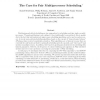Free Online Productivity Tools
i2Speak
i2Symbol
i2OCR
iTex2Img
iWeb2Print
iWeb2Shot
i2Type
iPdf2Split
iPdf2Merge
i2Bopomofo
i2Arabic
i2Style
i2Image
i2PDF
iLatex2Rtf
Sci2ools
116
click to vote
IPPS
2003
IEEE
2003
IEEE
The Case for Fair Multiprocessor Scheduling
Partitioning and global scheduling are two approaches for scheduling real-time tasks on multiprocessors. Though partitioning is sub-optimal, it has traditionally been preferred; this is mainly due to the fact that well-understood uniprocessor scheduling algorithms can be used on each processor. In recent years, global-scheduling algorithms based on the concept of “proportionate fairness” (Pfairness) have received considerable attention. Pfair algorithms are of interest because they are currently the only known method for optimally scheduling periodic, sporadic, and “rate-based” task systems on multiprocessors. In addition, there has been growing practical interest in scheduling with fairness guarantees. However, the frequency of context switching and migration in Pfair-scheduled systems has led to some questions concerning the practicality of Pfair scheduling. In this paper, we investigate this issue by comparing the PD2 Pfair algorithm to the EDF-FF partitioning scheme, which...
Algorithm | Distributed And Parallel Computing | IPPS 2003 | Pfair Scheduling | Uniprocessor Scheduling Algorithms |
Related Content
| Added | 04 Jul 2010 |
| Updated | 04 Jul 2010 |
| Type | Conference |
| Year | 2003 |
| Where | IPPS |
| Authors | Anand Srinivasan, Philip Holman, James H. Anderson, Sanjoy K. Baruah |
Comments (0)

